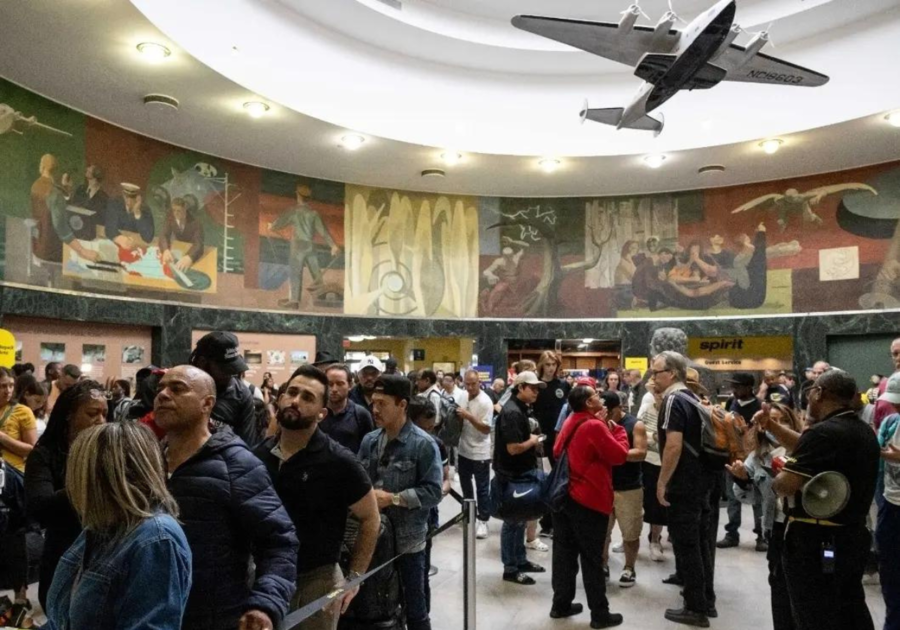A faulty software update caused technological havoc worldwide on Friday, grounding flights, knocking down some financial companies and news outlets, and disrupting hospitals, small businesses and government offices.
The breadth of the outages highlighted the fragility of a digitized world dependent on just a few providers for key computing services.
The trouble was sparked by an update issued by cybersecurity firm CrowdStrike and only affected its customers running Microsoft Windows, the world's most popular operating system for personal computers. It was not the result of hacking or a cyberattack, according to CrowdStrike, which apologized and said a fix was on the way.
Businesses and governments worldwide experienced hours-long disruptions — their computer monitors glowing blue with error messages — and they scrambled to deal with the fallout. CrowdStrike's CEO said some of their systems will require time-consuming manual fixes.
Thousands of flights were canceled and tens of thousands were delayed, leading to long lines at airports in the U.S., Europe and Asia. Airlines lost access to check-in and booking services in the heart of the summer travel season.
Several local TV stations in the U.S. were prevented from airing the news early Friday, and some state and local governments reported problems at courts, motor vehicles departments, unemployment agencies, emergency call centers and other offices.
Affected hospitals had problems with appointment systems, forcing them to suspend patient visits and cancel some surgeries.
American Express said it temporarily had some difficulties processing transactions, while TD Bank responded to online complaints by saying it was working to "restore" customers' ability to access their accounts.
Elsewhere, people experienced minor inconveniences, including trouble ordering ahead at Starbucks, causing long lines to form at some of the coffee chain's stores.
In New York City's Times Square, right before 12:30 a.m., the blue "recovery" screens popping up on laptops appeared on several giant electronic billboards. A few were dark Friday afternoon.
CrowdStrike said in a recording on its customer service line that the problem was related to "the Falcon sensor," referring to one of its products used to block online attacks. The company says it has 29,000 customers.
In an interview on NBC's "Today Show," CrowdStrike CEO George Kurtz apologized, saying the company was "deeply sorry for the impact that we've caused to customers, to travelers, to anyone affected by this, including our companies."
While CrowdStrike's update was automated, the fix requires hands-on work such as deleting corrupted files, which could take some customers days or longer.
Given that CrowdStrike has a ton of customers, a ton of Fortune 500 customers, and they have likely millions of (computers) under management, this causes a bigger issue. It is going to be a long and arduous process.
Shares of CrowdStrike, which is based in Austin, Texas, fell nearly 10% on Friday. Microsoft's stock price fell more than 3%.
Though the outage's impact could be felt far and wide, the forecasting firm Capital Economics said it was likely to have little impact on the world economy.
Cybersecurity experts said those affected by the outage also needed to be wary of bad actors reaching out claiming they can help.
Air travel delayed everywhere. Most airlines attributed the problems to their booking systems. Thousands of flights were affected in the U.S. alone, though by late morning on the East Coast airlines said they were beginning to mitigate problems and resume some service. Unclogging the system takes time, though.
Airlines and railways in the U.K. experienced long wait times. And airports across Europe suspended landings or halted takeoffs for several hours due to difficulties in checking in passengers.
Broadcasters go dark, surgeries delayed, 'blue screens of death' In Australia, national news outlets — including ABC and Sky News Australia — were unable to broadcast for hours. Some news anchors went on-air from dark offices, in front of computers showing blue error screens.
Hospitals in different countries also reported problems.
Britain's National Health Service said the outage caused problems at most doctors' offices because appointment and patient-record systems were affected.
At Mass General Brigham, the largest health care system in Massachusetts, all scheduled non-urgent surgeries, procedures, and medical visits were canceled Friday because of the outage, according to a spokesperson.
Some international shipping was disrupted, too. A major container hub in the Baltic port of Gdansk, Poland said it was battling problems. And at the twin ports of Los Angeles and Long Beach, marine terminals were affected, although the outage didn't cause significant disruptions.
 When visiting events and local businesses, be sure to tell them Macaroni KID sent you... and don't forget to tell all your friends!
When visiting events and local businesses, be sure to tell them Macaroni KID sent you... and don't forget to tell all your friends!
 |  |  |






